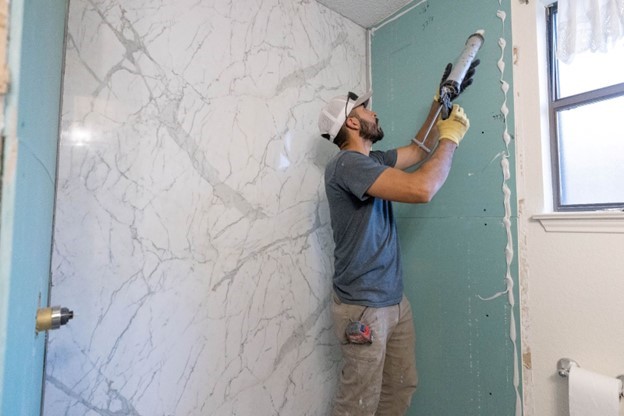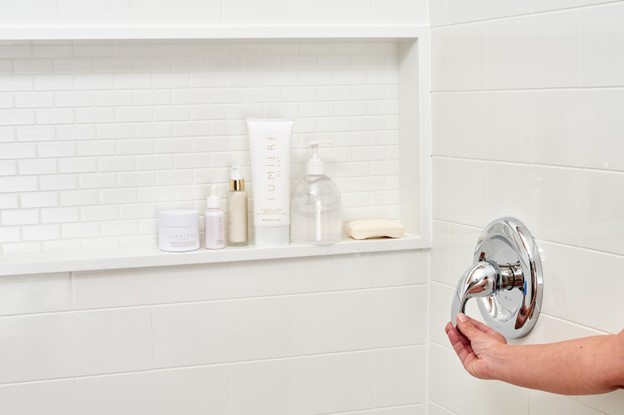One of the many reasons that you may be contemplating a shower remodel is that you can’t stand your current bathroom maintenance routine. Maybe you’re constantly fighting off mold, mildew, and water damage. Maybe you’re just sick of scrubbing every square inch of your shower walls to get rid of soap scum and discoloration. One thing is for sure: you want to pick low-maintenance shower materials moving forward.
ZINTEX Remodeling Group has designed and installed thousands of new showers for homeowners across 11 states, and we’ve learned a thing or two about shower maintenance. By the end of this article, you’ll know what your options are, what it takes to keep them clean, and how long they’re built to last.
Which material is going to give you the least trouble? Read on to find out.
Standard Shower Materials: What Are Your Options?
Before we can get into the nitty gritty of shower material maintenance, we need to talk about what those materials are. Most shower installation professionals will specialize in one of the following:
- Acrylic: a high-tech polymer that is non-porous and 100% waterproof when installed properly; offers an increasing variety of colors and patterns, including high-end options that mimic tile and grout or natural stone
- Tile: typically made from ceramic, porcelain, or glass and installed with grout; available in a huge variety of colors and textures with many different installation patterns to choose from
- Solid surface: luxury-grade panels made of natural stone such as quartz, marble, or granite; available in different colors and tones with patterns created by natural veining
Already, you can see how different these materials are, running the gamut from synthetic to organic. Unsurprisingly, the care for each material looks pretty different, as well.
Which Shower Materials Require Specialty Cleaning Supplies?
Let’s start at the very beginning of your shower maintenance routine: you’re standing in the bathroom cleaning aisle at your local home improvement store. Which products should you buy?
Acrylic doesn’t require any specialty supplies, but you should stick with mild cleaners like 409. Avoid store-bought cleaners that include bleach or other caustic chemicals, as these are designed to break down other materials and can lead to acrylic discoloration. If you prefer a homemade mixture, try one of these simple combinations:
- Mix one part distilled white vinegar with one part water
- Add two tablespoons of dish soap to two cups of warm water
When you’re shopping for tile, you need to think not only about the material your tile is made of (e.g., ceramic vs. glass) but also about the grout holding it all together. Most tile responds well to a mild, non-caustic cleaner, but you may want a separate grout cleaner that can effectively kill mold and mildew.
Though solid surface is relatively easy to clean, it is most likely to require a specialty cleaner. Fortunately, you can find plenty of store-bought products designed to not only clean the natural stone but also reseal it to maintain water resistance.
Which Shower Materials Are Easiest to Clean?
You’ve got your cleaning supplies and a couple of microfiber or terrycloth towels. Now what?
With no exposed grout or caulk, acrylic showers are extremely easy to clean, requiring very little pressure or scrubbing. Simply spray your cleaning mixture, allow it to sit for a few minutes, and wipe it away with a damp, clean cloth.
Tile can be just as easy to clean as acrylic, but grout and caulk are another story. In fact, you’ll probably need an abrasive scrub brush to really work your cleaner into these porous adhesives to kill any mold spores before they can spread.
Solid surface takes about the same amount of effort as acrylic, which is to say that you won’t need a ton of elbow grease. However, you’ll probably need to have your natural stone shower professionally resealed every three or four years (or when you start to notice that water is no longer beading on the surface of your shower walls, indicating that the waterproofing seal has broken down).
How Durable Are Different Shower Materials?
With proper upkeep, your shower wall materials won’t need routine professional maintenance. You’ll really only need to call in the professionals if you’ve got a plumbing problem or you suspect that your shower is no longer waterproof.
How long will each material last before you need to do a full replacement?
| Shower Materials | Average Lifespan |
|---|---|
| Acrylic | 15-20 years |
| Tile | 15-20 years |
| Solid surface | 15-30 years |
As you can see, all three options perform pretty well as far as durability goes. You’ll get the longest potential lifespan out of solid surface, but solid surface also tends to cost more upfront than both acrylic and tile and may require professional resealing.
What Material Should I Choose for Low-Maintenance Living?
Here’s one last look at the maintenance pros and cons of acrylic, tile, and solid surface before we declare the low-maintenance winner:
| Materials | Maintenance Pros | Maintenance Cons |
|---|---|---|
|
Acrylic | ✅Easy to clean with no specialty supplies needed ✅100% waterproof ✅No resealing or regrouting necessary ✅Difficult to crack or damage | ❌Caustic chemicals or abrasive cleaners could cause mild surface damage or discoloration ❌Will require full panel replacement if the acrylic cracks or otherwise breaks |
|
Tile | ✅Easy to clean individual tiles ✅Easy to replace damaged tiles as needed | ❌Grout requires a lot of elbow grease to clean and frequent resealing ❌Grout and tile are not a 100% waterproof system and can cause water damage and mold growth |
|
Solid surface | ✅Easy to wipe down ✅Waterproof with proper care ✅Difficult to crack or damage | ❌Cleaning supplies not designed for natural stone can cause permanent damage ❌Natural stone is porous and requires resealing to ensure a waterproof shower |
If you want to spend as little time and effort as possible cleaning your shower, acrylic is the right shower material for you. It takes next to no elbow grease, no specialty cleaning supplies, and you don’t have to worry about mold, mildew, or water damage.
Solid surface is the clean runner-up, which is great news for anyone looking for a luxury bathroom makeover. While it typically does come with the biggest price tag and may require professional resealing every few years, it won’t be difficult to keep clean using DIY methods.
Last but not least, we have tile. While tile is relatively easy to clean, grout does require a good bit of elbow grease to keep mold and mildew growth from taking over.
Additional FAQs About Choosing Shower Materials
Q: How much will a shower remodel cost?
A: Shower remodel costs will reflect a few different factors, including the materials you choose. Acrylic showers tend to cost the least, ranging from $11,000 on the most basic end and $24,000+ on the luxury end. Solid surface materials tend to cost the most, ranging from $16,000 to $34,000+.
Q: How will a new shower impact my home value?
A: With professional installation and quality materials, you should see a good ROI in the form of a property value increase. According to the Journal of Light Construction, a midrange bathroom remodel can yield an ROI of up to 73.7%. Midrange remodels typically include one or two appliance upgrades (including a new shower) and a few small aesthetic improvements (like a new coat of paint).
Q: Should I install a walk in shower or shower and tub combo?
A: If you are looking to increase accessibility for seniors or disabled household members or you simply want a sleeker, more modern bathroom, consider a walk in shower. If you enjoy taking baths or have young children and you don’t have another bathtub in the house, consider a shower and tub combination.
Learn More About Shower Remodels to Make Informed Choices
All you want is a shower that’s easy to keep clean. Now you know that acrylic is the best choice in terms of affordability and maintenance, with solid surface coming in at a (higher-cost) close second.
How long will it take to get your remodel going? At ZINTEX Remodeling Group, we specialize in acrylic shower remodels, and we’re here to share everything there is to know. Now that you know which shower wall material is right for you, discover the shower remodel timeline for every material to get one step closer to your new shower.
Subscribe to ZINTEX Remodeling Group's Blog




